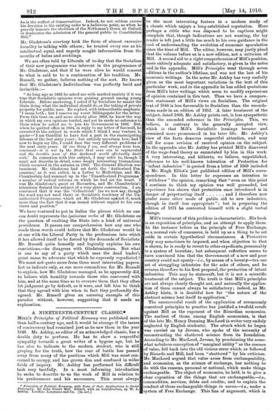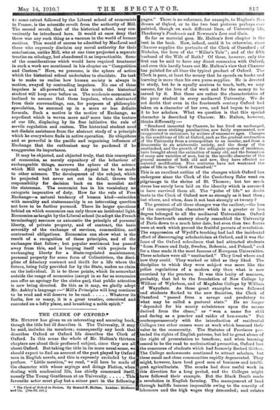A NINETEENTH-CENTURY CLASSIC.* MILL's Principles of Political Economy was published
more than half-a-century ago, and it would be strange if the issues of controversy had remained just as he saw them in the year 1848. Mr. Ashley, as editor of an acknowledged classic, has a double duty to perform. He has to show a respectful sympathy towards a great writer of a bygone age, but he has also to indicate to the modern student, who is still groping for the truth, how the roar of battle has passed away from many of the positions which Mill was most con- cerned to occupy, and has grown dim and confused in wider fields of inquiry. Mr. Ashley has performed his difficult task very tactfully. In a most informing introduction he seeks to describe to us the work of Mill in relation to his predecessors and his successors. This must always
• Principles of Political Economy, with Sons of Moir Applications to Social Philosophy. By John Stuart Mill. Edited, with an Introduction, by W. J. Ashley. London: Longmans and Co. [58. net.]
be the most interesting feature in a modern study of a classic which enjoys a long-established reputation. Here perhaps a critic who was disposed to be captious might complain that, though 'indications are not wanting, the lay reader is left just a little too much to his own guidance in the task of understanding the evolution of economic speculation since the time of Mill. The editor, however, may justly plead that the volume before us is a new edition, not a criticism of Mill. A second aid to a right comprehension of Mill's position, more entirely adequate and satisfactory, is given in the notes and in the appendix. Mill's Principles went through seven editions in the author's lifetime, and was not the last of his economic writings. In the notes Mr. Ashley has very usefully given us the most important variations in the text of this particular work, and in the appendix he has added quotations from Mill's later writings which seem to modify expressions of opinion contained in this text. Thus we have a compara- tive statement of Mill's views on Socialism. The original text of 1848 is less favourable to Socialism than the emenda- tions made in an edition of 1852. A later treatment of the subject, dated 1869, Mr. Ashley points out, is less sympathetic than the amended reference in the Principles. This, we believe, is contrary to the generally accepted view, which is that Mill's Socialistic leanings became and remained more pronounced in his later life. Mr. Ashley's view of the facts deserves respectful attention, and may call for some revision of received opinion on the subject. In the appendix also Mr. Ashley has printed Mill's disavowal of the wage-fund theory as enunciated by him in this work. A very interesting, and hitherto, we believe, unpublished, reference to his well-known toleration of Protection for "infant industries" is quoted from a letter of 1869 included in Mr. Hugh Elliot's just published edition of Mill's corre- spondence. In this letter he expresses an intention to " withdraw " the opinion, remarking that "even on this point I continue to think my opinion was well grounded, but experience has shown that protection once introduced is in danger of perpetuating itself and I therefore now prefer some other mode of public aid to new industries, though in itself less appropriate " ; but in preparing the edition of 1871 he contented himself with a slight verbal change.
Mill's treatment of this problem is characteristic. His book is an exposition of principles, and an attempt to apply them. In the instance before us the principle of Free Exchange, as a normal rule of commerce, is held up as a thing to be set aside in certain hypothetical circumstances. A Protective duty may sometimes be imposed, and when objection to that is shown, he is ready to revert to other expedients, presumably to a system of bounties ; but subsequent reflection seems to have convinced him that the Government of a new and poor country could not openly--i.e., by means of a bounty—tax one set of struggling industries for the sake of others, and he returns therefore to his first proposal, the protection of infant industries. This may be statecraft, but it is not a scientific treatment of the subject. The truth is that Mill's principles are not always clearly thought out, and naturally the applica- tion of them cannot always be satisfactory; indeed, as Mr. Ashley hints, it is doubtful how far "the nature of the abstract science lent itself to application."
The unsuccessful result of the application of erroneously conceived principles to practice has justified a twofold revolt against Mill as the exponent of the Ricardian economics. The earliest of these, among English economists, is that of the late Mr. Henry Dunning MacLeod (a writer very unduly neglected by English students). The attack which be began was carried on by Jevons, who spoke of the necessity of reconstructing the shattered science from its foundation. According to Mr. MacLeod, Jevons, by proclaiming the some- what nebulous conception of "marginal utility" as the essence of value, fell back into the old vicious error which, as followed by Ricardo and Mill, had been " shattered " by his criticism.
Mr. MacLeod argued that value arose from exchangeability, and economics, as the science of exchange, has nothing to do with the reasons, personal or national, which make things exchangeable. The object of economics, he held, is to give a clear exposition of the things that are exchangeable,—i.e., commodities, services, debts and credits; and to explain the
conduct of these exchangeable things in vacuo,—i.e., under a system of Free Exchange. This line of argument, which is to some extent followed by the Liberal school of economists in France, is the scientific revolt from the authority of Mill The second revolt, that of the historical school, may con- veniently be introduced here. It would at once deny that there was any such thing as a vacuum in the world of human motives. This would of course be admitted by MacLeod and those who expressly disclaim any moral authority for their conclusions, unlike Mill, who at one time projected a separate treatise on ethology, but abandoned it as impracticable. Some of the considerations which would have required treatment in such a work are mentioned in his chapter on "Competition and Custom." Here, we presume, is the sphere of action which the historical school undertakes to elucidate. Its task is to make us realise how human society is always in motion, swayed by contending impulses. No one of these impulses is all-powerful, and this truth the historical student will keep ever before us. The academic economist is inclined to assume that these impulses, when abstracted from their surroundings, can, for purposes of philosophic speculation, be summed up in a more or less definite formula. Such a motive is the motive of Exchange, an expedient which is woven more and more into the texture of our life, displacing by its free initiative the rule of servile regulation and custom. The historical student need not disdain assistance from the abstract study of a principle which he everywhere finds in active operation. So ubiquitous and so powerful is the pacific and organising influence of Exchange that the enthusiast may be pardoned if he exaggerates its importance.
It may be objected, and objected truly, that this conception of economics, as merely expository of the behaviour of exchangeable things, narrows the sphere of the science which Mill sought to expound. Appeal has to be made to other sciences. The development of the subject, which be projected but never set out in detail, throws the responsibility for decision back on the moralist and the statesman. The economist has in his vocabulary no categoric imperative of duty. How far the rule of Free Exchange—a, natural tendency of human kind—coincides with morality and statesmanship is an interesting question not here to be further pursued. There lie larger questions behind on which economics can only throw an incidental light. Economics as taught by the Liberal school (to adopt the French terminology) assumes as axiomatic the principle of personal liberty, of private property, and of contract, the basis severally of the exchange of services, commodities, and contractual obligations. Economics can show what is the result of a recognition of these principles, and of the exchanges that follow; but popular sentiment has passed away from this, and is busying itself with projects for exchanging liberty for a State-regulated maintenance, personal property for some form of Collectivism, the disci- pline of fiduciary contract and thrift for a life where the future, being fully provided for by the State, makes no claim on the individual. It is to these points, which lie somewhat outside the range of economics (except in so far as economics can offer an apology for the status quo), that public attention is now being directed. Be this as it may, we gladly adopt Mr. Ashley's language :—" Mill's Principles will long continue
to be read and will deserve to be read. Whatever its faults, few or many, it is a great treatise, conceived and executed on a lofty plane, and breathing a noble spirit."







































 Previous page
Previous page